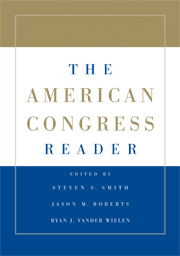Book contents
- Frontmatter
- Contents
- THE AMERICAN CONGRESS READER
- PART I THE AMERICAN CONGRESS: MODERN TRENDS
- PART II REPRESENTATION AND LAWMAKING IN CONGRESS: THE CONSTITUTIONAL AND HISTORICAL CONTEXT
- PART III CONGRESSIONAL ELECTIONS AND POLICY ALIGNMENTS
- PART IV MEMBERS, GOALS, RESOURCES, AND STRATEGIES
- PART V PARTIES AND LEADERS
- PART VI THE STANDING COMMITTEES
- PART VII THE RULES OF THE LEGISLATIVE GAME
- PART VIII THE FLOOR AND VOTING
- PART IX CONGRESS AND THE PRESIDENT
- 28 Presidential Veto Messages
- 29 Presidential Signing Statement
- 30 Veto Bargaining
- 31 The Dynamics of Legislative Gridlock, 1947–1996
- 32 The Politics of Shared Power
- 33 Conscience of a Conservative
- PART X CONGRESS AND THE COURTS
- PART XI CONGRESS, LOBBYISTS, AND INTEREST GROUPS
- PART XII CONGRESS AND BUDGET POLITICS
- PART XIII FURTHER READINGS ON CONGRESSIONAL POLITICS
29 - Presidential Signing Statement
Published online by Cambridge University Press: 05 June 2012
- Frontmatter
- Contents
- THE AMERICAN CONGRESS READER
- PART I THE AMERICAN CONGRESS: MODERN TRENDS
- PART II REPRESENTATION AND LAWMAKING IN CONGRESS: THE CONSTITUTIONAL AND HISTORICAL CONTEXT
- PART III CONGRESSIONAL ELECTIONS AND POLICY ALIGNMENTS
- PART IV MEMBERS, GOALS, RESOURCES, AND STRATEGIES
- PART V PARTIES AND LEADERS
- PART VI THE STANDING COMMITTEES
- PART VII THE RULES OF THE LEGISLATIVE GAME
- PART VIII THE FLOOR AND VOTING
- PART IX CONGRESS AND THE PRESIDENT
- 28 Presidential Veto Messages
- 29 Presidential Signing Statement
- 30 Veto Bargaining
- 31 The Dynamics of Legislative Gridlock, 1947–1996
- 32 The Politics of Shared Power
- 33 Conscience of a Conservative
- PART X CONGRESS AND THE COURTS
- PART XI CONGRESS, LOBBYISTS, AND INTEREST GROUPS
- PART XII CONGRESS AND BUDGET POLITICS
- PART XIII FURTHER READINGS ON CONGRESSIONAL POLITICS
Summary
Signing statements are written declarations issued by the president at the time of signing legislation that indicate to Congress how he intends to direct his administration in the implementation of the law. In practice, presidents in recent history have controversially used signing statements to reject sections of statutes without vetoing the legislation in its entirety.
PRESIDENT's STATEMENT ON SIGNING OF EMERGENCY SUPPLEMENTAL APPROPRIATIONS ACT FOR DEFENSE, THE GLOBAL WAR ON TERROR, AND HURRICANE RECOVERY, 2006
Today, I have signed into law H.R. 4939, the “Emergency Supplemental Appropriations Act for Defense, the Global War on Terror, and Hurricane Recovery, 2006.” The Act provides additional resources needed to fight the war on terror, help citizens of the Gulf States recover from devastating hurricanes, and protect Americans from a potential influenza pandemic.
Sections 1209 and 2202 of the Act prohibit use of certain funds appropriated in the Act to initiate new start programs unless the congressional defense committees receive advance written notice. The Supreme Court of the United States has stated that the President's authority to classify and control access to information bearing on the national security flows from the Constitution and does not depend upon a legislative grant of authority. Although the advance notice contemplated by sections 1209 and 2202 can be provided in most situations as a matter of comity, situations may arise, especially in wartime, in which the President must act promptly under his constitutional grants of executive power and authority as Commander in Chief of the Armed Forces while protecting certain extraordinarily sensitive national security information.
- Type
- Chapter
- Information
- The American Congress Reader , pp. 322 - 323Publisher: Cambridge University PressPrint publication year: 2008

